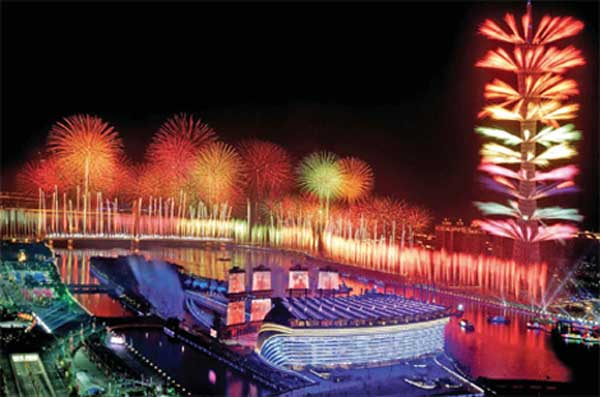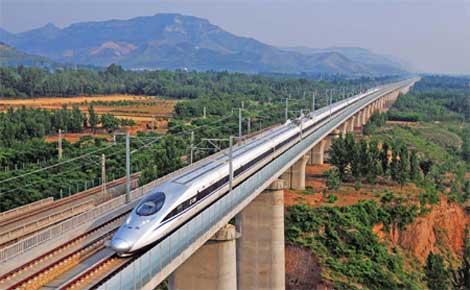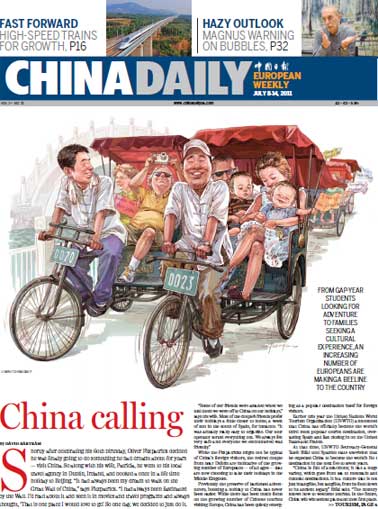Burning desire
Updated: 2011-07-08 11:25
By Xiao Xiangyi (China Daily European Weekly)
 |
|
Panda Fireworks Group was responsible for this stunning display at last year's Asian Games in Guangzhou. Provided to China Daily |
Tradition overrides public safety as fireworks make an explosive comeback
A Chinese Spring Festival without fireworks is like a European Christmas without a Christmas tree. For the past 2,000 years, on the eve of the all-important Spring Festival, fireworks have been a compulsory part of household celebrations. The loud noises and colorful sparks shooting in the night sky are symbols of the happiness and hope every family feels when a new year begins.
Over the past five years, firework displays each year have been getting bigger and better but between 1994 and 2006, the government ordered a nationwide ban because of safety concerns.
Hundreds of people, suffering burns and missing fingers, were being rushed to hospitals and sales of the iconic Chinese product were outlawed in more than 280 cities around the country.
The ban had an immediate affect. Health authorities reported a 46 percent annual drop in firecracker-related injuries and emergency services said accidental fires were down 53 percent.
But after a decade-long ban, the Spring Festival fireworks tradition was sorely missed and the public overwhelmingly spoke out through media for the ban to be lifted.
Folklore expert Zhao Shu was one of the many who were successful in demanding their return.
"Why can't people let off fireworks?" he asks. "It is a custom, a ritual and a sign of blessing that cannot be banned with temporary regulations.
"For most of our lives, our time is quiet and invisible, but fireworks make the big moments in our lives seen and heard."
China is the home of fireworks, and there are many stories about their origin. One of the most popular legends points to a cook who happened to mix saltpeter, charcoal and sulfur when cooking in the field kitchen. The first firecracker was shot when the mixture compressed in the bamboo tube burnt and exploded.
Another story says they were invented about 1,000 years ago in the city of Liuyang, in Hunan province (dubbed as the "cradle of fireworks) by an alchemist called Li Tian, who packed gunpowder into a paper tube and set it on fire.
The lighting of fireworks in China is regarded as a gesture of good luck when celebrating important moments, such as births, deaths, weddings and moving into a new house.
For many Europeans, firework displays may be seen as a light moment of fun, but for the Chinese, they play an almost religious role in life, according to one expert.
"Fireworks are a necessity, which have permeated into Chinese tradition, life and even beliefs. They are related to rituals and religion," says Huang Qichang, president of Qingtai Company, one of China's biggest fireworks producers.
Europeans have enjoyed fireworks after Marco Polo reportedly brought gunpowder back to Europe in the mid-13th century.
The Italians became the first Europeans to manufacture fireworks with powder followed by the Germans, who began the fireworks production in the 18th century.
Andreas Voigt, a German researcher and fireworks expert, came to Liuyang a few years ago to develop new fireworks production technology. He invented re-loadable firework shells and has already put them into production.
"Unlike the US, France or even Switzerland, which always celebrate their national days by shooting fireworks, the most important day in Germany for fireworks is Dec 31, the New Year Eve," he says. "It is a luxury actually, but people just love it. They should have some beautiful way to celebrate the life. I think they are a better solution than alcohol or tobacco."
China still plays a dominant role in global fireworks production and more than 6,000 domestic factories make about 90 percent of the world's fireworks, according to the International Fireworks Association (IFA).
However, the traditional skills are under threat and the industry is struggling to find new recruits to take up the trade. More than 80 percent of fireworks factory workers are older than 30, says Liu Donghui, secretary general of IFA.
Zhong Ziqi, president of Dancing Fireworks Group, says some of the traditional skills have not been passed on to the next generation. "So we cannot produce some of those special effects like we did in the old days," he says.
Nineteen-year-old Lin Fang is a typical young migrant worker. "I don't think I'll stay long here. My dream is to go to Shanghai one day, " says Lin, who is working in Liuyang together with his parents.
For more than 80 years, fireworks master craftsman, Lan Qingbo, 94, has witnessed the development of fireworks in his famous city.
He says that once a year, all Liuyang residents go to the temple to worship Li Tian the "Father of Fireworks" and offer sacrifices and prayers for their safety. "Generation after generation of people who have lived in Liuyang have made their livelihood from fireworks," he says.
When Lan was 11, he began to learn the traditional skills, such as rolling the paper tubes, filling the tubes with saltpeter and burying fuses. He served as an apprentice at Peidehou, a family-owned fireworks firm, which became famous during the beginning of the last century.
Peidehou collected fireworks from every family workshop in Liuyang and then sold them to big cities in China. Its branch in Hong Kong even sold them to Singapore and Malaysia.
"The production procedures were intricate and delicate and all completely done by hand and it is dangerous, but as you can see, I still have 10 fingers," he says smiling and holding up his well-worn hands.
"We are basically afraid of two things - water and fire, which are fatal to fireworks production."
Even though Lan is retired he still pays attention to technical developments. "Fireworks now have more effects and colors, and I am happy with that," he says.
Zhao Weiping, chairman of the board of Panda Fireworks Group, believes fireworks can express a deep-rooted feeling within everybody.
"People have to release their emotion, and forget their troubles and that is what fireworks enable them to do," he says.
In his composition Fireworks, Hong Kong poet Zhang Shijian hopes that fireworks can one day be a solution to world peace.
"It will be cool if all the gunpowder in this world was made into stunning fireworks."
E-paper

Safeguarding train technologies
China is filing patent applications for its high-speed railway technologies abroad under the Patent Cooperation Treaty (PCT) to pave the way for tapping overseas markets, according to a senior railway official.
China calling
School of hard knocks
Burning desire
Specials

90th anniversary of the CPC
The Party has been leading the country and people to prosperity.

My China story
Foreign readers are invited to share your China stories.

Green makeover
Cleanup of Xi'an wasteland pays off for ancient city
